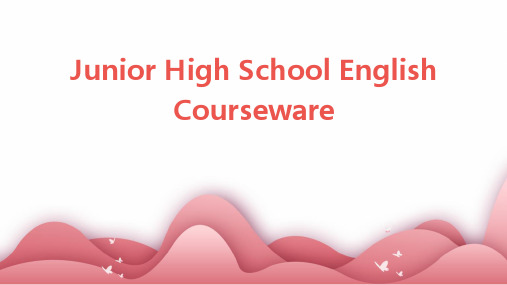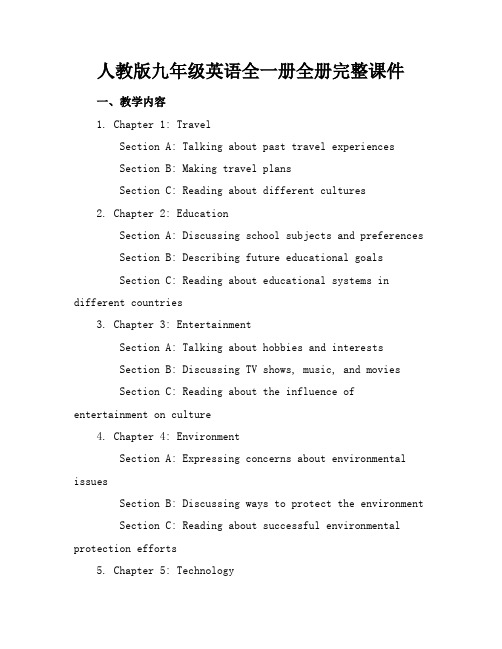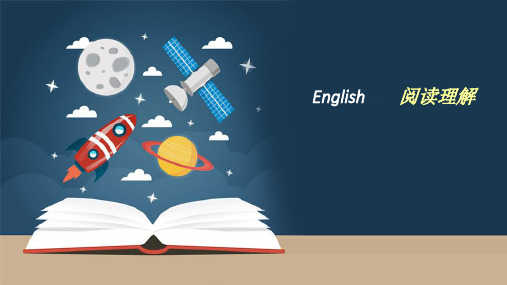初三英语 课PPT课件
初三英语课件ppt

Review Objectives and Content
Writing
Train students' writing skills, improve their ability to express their ideas in English, and enhance their language sense
Speaking
Train students' speaking skills, improve their ability to use English in daily communication, and enhance their language sense
Review strategies and methods
Oral Review
Oral skills
Oral practice
Teach students how to express their opinions fluently and confidently, including guidance on pronunciation, intonation, grammar, and vocabulary.
Week 5
Reading and writing review and practice
Week 6
Listening and speaking review and practice
Review schedule
01
02
03
Week 7
Vocabulary
and
grammar final exam
• Listening materials: Select representative listening materials, including dialogues, short texts, news, movie clips, etc., so that students can become familiar with the pronunciation and pace of different types of materials.
人教版九年级全册Unit1课件 (共25张PPT)

listening to music when learning
sleeping in class
talking with other students in class
They are not good habits for learning English.
1. What does “Practice makes perfect.” mean? Keep practicing. 2. If successful learners make mistakes, what do they often do? They learn from mistakes.
Read, study and learn about everything imporant in your life
Read Paragraph 3 and answer the questions.
Practicing and learning from mistakes Good learners think about what they are good at and what they need to practice more. Remember, “Use it or lose it.” Even if you learn something well, you will forget it unless you use it. “Practice makes perfect.” Good learners will keep practicing what they have learned, and they are not afraid of making mistakes. Alexander Graham Bell did not invent the telephone overnight. He succeeded by trying many times and learning from his mistakes.
仁爱版 初三英语九年级上册Unit1 Topic1PPT课件

Topic 1 Our country has developed rapidly. Section A
2024/8/23
2024/8/23
2024/8/23
• have/has been to…去过。。。 • He has been to Hubei. • 他去过了湖北 (人已经不在湖北) • I have been to Beijing. • 我去过了北京。(人已经不在北京) • have/has gone to... • 已经去了,它强调主语此时不在说话地点。 • e.g. She has gone to Hubei. • 她已经去了湖北。(人已经不在说话地点) • She has gone to Beijing. • 他已经去了北京。 (人已经不在说话地点)
2024/8/23
p124
2024/8/23
Find the sentences with Present Perfect Tense in Section A. Read them aloud.
You have just come back from your hometown.
Great changes have taken place there and my hometown has become more and more beautiful.
2024/8/23
2a TLhisetennetoxtthedcaoyn,vMerasartiiaoncaanmd feillbinatchke .blSanhkes.mTheetn practice it withMyoicurhpaaertlneirn. the school.
人教版九年级英语全一册全册完整课件

人教版九年级英语全一册全册完整课件一、教学内容1. Chapter 1: TravelSection A: Talking about past travel experiencesSection B: Making travel plansSection C: Reading about different cultures2. Chapter 2: EducationSection A: Discussing school subjects and preferences Section B: Describing future educational goalsSection C: Reading about educational systems in different countries3. Chapter 3: EntertainmentSection A: Talking about hobbies and interestsSection B: Discussing TV shows, music, and moviesSection C: Reading about the influence of entertainment on culture4. Chapter 4: EnvironmentSection A: Expressing concerns about environmental issuesSection B: Discussing ways to protect the environment Section C: Reading about successful environmental protection efforts5. Chapter 5: TechnologySection A: Using technology in daily lifeSection B: Discussing the advantages and disadvantages of technologySection C: Reading about technological innovations6. Chapter 6: HealthSection A: Talking about exercise and healthy habits Section C: Reading about the importance of mental health7. Chapter 7: JobsSection A: Discussing dream jobs and career aspirationsSection B: Describing job responsibilities and qualificationsSection C: Reading about successful entrepreneurs8. Chapter 8: CultureSection A: Exploring traditional festivals and customsSection B: Comparing different cultures and promoting cultural understandingSection C: Reading about cultural exchange programs9. Chapter 9: SafetySection A: Talking about safety rules and precautions Section B: Discussing emergencies and natural disastersSection C: Reading about safety education10. Chapter 10: Life GoalsSection A: Sharing life goals and aspirationsSection B: Setting realistic goals and planning for the futureSection C: Reading about inspirational individuals二、教学目标2. Cultivate students' ability to read and understand different text types.3. Enhance students' awareness of cultural diversity and promote cultural understanding.三、教学难点与重点1. Mastering target vocabulary and sentence structures.3. Improving speaking and writing skills throughpractical activities and reallife situations.四、教具与学具准备1. Multimedia projector2. Whiteboard and markers3. Handouts with vocabulary lists, reading materials, and exercises4. Recording devices for listening activities五、教学过程1. Warmup: Engage students in a brief discussion about the topic of the day.2. Presentation: Introduce new vocabulary and sentence structures through reallife examples and practice dialogues.3. Practice: Provide students with practical activities, such as roleplays, group discussions, and writing exercises.4. Listening and speaking activities: Play audio recordings, and guide students to practice their listening and speaking skills.5. Reading: Assign reading materials and guide students through skimming, scanning, and intensive reading exercises.6. Grammar focus: Explain and practice targeted grammar points.7. Production: Encourage students to create their own dialogues, presentations, or written pieces based on the topic.8. Summary: Review key points and answer students' questions.9. Homework assignment: Provide homework tasks and answer any questions.六、板书设计The board will display key vocabulary, sentence structures, grammar points, and a visual representation of the lesson's structure.七、作业设计1. Write a paragraph about your favorite hob, including why you enjoy it and how often you engage in it.Answer: (Student's paragraph)2. Create a dialogue between two friends discussing their future educational goals.Answer: (Student's dialogue)3. Read the article about successful environmental protection efforts and summarize the main points.Answer: (Student's summary)八、课后反思及拓展延伸Reflect on the effectiveness of teaching methods and student engagement. Consider incorporating additional resources, such as online videos, interactive games, or group projects, to enhance students' understanding and practical application of the topics covered. Encourage students to explore related topics beyond the classroom, fostering a love for lifelong learning.重点和难点解析1. 教学内容的覆盖与组织2. 教学目标的具体化3. 教学难点与重点的确定4. 教学过程的细节设计5. 板书设计的有效性6. 作业设计的针对性与实践性一、教学内容的覆盖与组织教学内容应全面覆盖教材的章节,同时要注重内容的逻辑顺序和递进关系。
Unit 1 课件(共35张PPT) 人教版九年级全册

1) It is no use/ good / useless + doing... 2) It is a waste of time + doing ... 3) It is fun + doing ... 在以上结构中常用动名词作主语。 It’s no use crying over spilt milk. 覆水难收。 It is fun playing with children. 和孩子们一起玩真好。
New words
Unit 1 Section A (Grammar Focus-4c)
repeat /rɪˈpiːt/
v.重复;重做
note /nəʊt/
n. 笔记;记录 v.注意;指出
pal /pæl/ n.朋友;伙伴 physics /ˈfɪzɪks/ n. 物理;物理学
chemistry /ˈkemɪstri/
A. playing B. to play C. play
Textbook
Unit 1 Section A (Grammar Focus-4c)
4a Match the questions and answers.
1. How do you practice speaking?
a. By watching English programs.
A. tell B. to tell C. telling
Grammar Focus
Unit 1 Section A (Grammar Focus-4c)
2. 用作宾语 1)作动词的宾语 常见的此类动词有:practise, understand, worry about, finish, give up, keep, keep on, look forward to, mind, miss, enjoy, depend on, cannot help, suggest, pay attention to, think about, succeed in, be used to, get used to, put off,等。
中考英语阅读理解课课件(共29张PPT)

猜测词义的技巧
(1) 根据构词法猜测词义
Eg1. I had walked two kilometers before I found a phone-box and
eventually I was able to get a garage to send someone to give some
help.
Question: The world “eventually” means __________.
A. right away
B. at last
C. with difficulty
D. unhappily
Eg2: Most telephone hot lines are completely anonymous---callers
A. 700
B. 682
C. 388
D. 1070
Eg. Kuming has a population of more than 5,000,000. Question: What’s the population of Kuming? A. Over five millionB. Over five thousand C. Over five billion D. Over five hundred
阅读理解 推测词语意义
推测词语意义
推测词语意义是指在阅读过程中根据对语篇提供的信息、逻辑、背景 知识及语言结构等的综合理解去猜测或推断某一生词、关键词或短语的 词义。提高这种技巧可以使我们在阅读过程中能很快通过上下文提供的 线索或生词本身的结构特点推断出词义来,从而提高阅读速度和阅读能 力。 1.What does the underlined word “...” mean? 2. By saying “...” ,the writer means _______. 3. The meaning of the word is __________. 4. The underlined word “...” probably means ______. 5. The word “...” refers to ________. 6. The underlined word “...” can be replaced by ____. 7. Which is the following is the closet in meaning to the word……?
人教版九年级英语上册 Unit4第4课时 教学课件PPT初三公开课
Unit4I used to be afraid of the dark. Section B1a-1eRJLearning goals1. New words : ant, insect2. Sentence: I used to be nervous about tests all the time.Warming upTalk about the pictures with used to and now.Talk about the pictures with used to and now.Talk about the pictures with used to and now.Talk about the pictures with used to and now.Talk about the pictures with used to and now.Talk about the pictures with used to and now.1a What did these kids use to like when they were young?P.E. class1a What did these kids use to like when they were young?painting pictures1a What did these kids use to like when they were young?music class1a What did these kids use to like when they were young?ants and other insects1a Check (✔) the things you used to like when you were a child.music classants and other insectsP.E. class___ painting pictures_________1b What other things did you use to like to do when you were a child? Write sentences in the box. Then discuss them with a partner.I used to like watching scary movies when I was a child.I used to like dancing with my grandma.I used to play Chinese chess with my father.…What did you use to like when youwere a child?1b Use your sentences to talk with your partner.What else did you use to like?Did you use to like …?Yes, I did./ No, I didn’t.I used to like …I used to like …Read the following sentences and make sure you know the meanings.1. I didn’t use to like tests.2. We used to walk to school.3. I used to hate P.E. class.4. I used to be on the soccer team.________________1c Listen and check (✔) the sentences you hear.1. I didn’t use to like tests.2. We used to walk to school.3. I used to hate P.E. class.4. I used to be on the soccer team.________________In the past NowGirl I didn’t use tolike_________.I don’t worry about__________.We used to wear_____________school.We can wear________________school.1d Please try your best to fill the chart according to the memory.o o ttIn the past NowBoy We used toevery day after school.We allthe time.I used to hate__________.I P.E. class.________________________________In the past NowGirl I didn’t use tolike___t_est__s___.I don’t worry about__________.We used to wear_____________school.We can wear________________school.1d Listen again. What do the girl and the boy say about things in the past and now? Fill in the chart.whatever we like to school uniforms totestsIn the past NowBoy We used toevery day after school.We allthe time.I used to hate__________.__________I love P.E.class.play________P.E. classstudy______________Listen again, answer the following questions.1. How did the boy feel the tests in primary school?A. Easy.B. Difficult.C. Great.2. What did the girl use to have to wear?A. School uniforms.B. Whatever she liked.C. Formal clothes.Yes, me too. And I used to ...I used to be nervous about tests all the time. What about you?1e Compare yourself with your partner.对 … …感到紧张1.— I do feel a little _________ about making a speech.— Take it easy. The more you prepare, the better you will feel.A. angryB. disappointedC. nervousD. bored ExercisesC7. (龙东中考)Your partner always gets up early on school days. He’s seldom been late for school,_C_____?A.isn’t heB.is heC.has he1.Tom used to have long hair. (改为一般疑问句 ) Di___d__ Tom __u_s_e__ to have long hair?2.The boy used to wear glasses. (改为反意疑问句 ) The boy used to wear glasses, _di__d_n_’t_ _he_____?3.My father often rode his bike to work last year. (改为 同义句 )4.My father _us__e_d__ _to_____ ride his bike to work last year.4. John used to collect stamps. (对画线部分提问 )W__h_at__di__d___John_u_s_e____t_o____d_o__?5. She used to do exercise in the morning. (改为否定句 )She_di__d_n_’t__use______to____do exercise in the morning.6. He hardly watches TV. (变为反意疑问句 )He hardly watches TV, __d_o_e_s__ _he_____?Sentence I used to be nervous about tests all the time.be nervous about Key words ant, insect tinsect Usefulexpression SummaryHomeworkYou are in Grade Nine now. Is your life quite different from before? Write a short passage about it using used to.!。
人教版九年级英语unit8全单元完整ppt课件
12. I’d like to thank you for sending money to
“Animal Helpers”, an organization set up to help
disabled people. (P66)
②three very special young 为多个形容词修饰名词
people.
多个形容词修饰名词的顺序为:限定词 性质 大小 形状 年龄 颜色 国家 材料。
e.g. a beautiful little new white wooden house
一座漂亮的新的小白木屋
精选
注释:
“限定词”包括:冠词、物主代词、指示代词或数词 ,它们位于各类形容词前。“描绘”性形容词有: beautiful, bad, cold, great等。“大长高”表示大小、 长短、高低等的一些词。表示“形状”的词有: round, square等。“国籍”指一个国家或地区的词。 表示“材料”的词有:wooden, woolen, stone, silk等 。表示“用途”的词有:medical, college, writing, police等。
7. You could start a Chinese History Club. (P62)
start动词,此处意为“创办,建立”,相当于set up,此时不 能与begin互换。
e.g. He started a new shop last year.
拓展:start用作动词时的本义为“开始”,相当于begin。 后接名词、代词、动词不定式或动名词。
e.g. I think it very important to take part in the discussion. I find it difficult to talk to you.
初三英语ppt课件
Course Introduction
Improve English listening and speaking skills: Through interactive PPT presentations, students will practice listening to English audio materials and speaking English in different scenarios, enhancing their language skills
Prop nouns
Objective
01
An objective is a descriptive word that modifies a noun or pronoon For example, "big," "happy," and "red" are all advertisements
English PPT courseware for junior high school stud
contents
目录
Course IntroductionVocabulary learningGrammar interpretationReading comprehensionWriting PracticeListening training
These types of questions will raise questions about the article and require students to answer them in their own language. This type of question can help students deeply understand the theme and details of the article, and improve their language expression and organizational skills.
人教版九年级英语全一册全册完整课件
人教版九年级英语全一册全册完整课件一、教学内容本节课为人教版九年级英语全一册Unit 10 Could you pleasetell us about your school? Section A 1a2d。
本节课主要围绕学生介绍自己的学校和日常生活展开,通过听、说、读、写等多种方式,让学生掌握一般现在时的表达方式,并能运用所学知识进行日常交流。
二、教学目标1. 学生能够听、说、读、写一般现在时,掌握主语+动词(动词三单形式)+其他的基本结构。
2. 学生能够运用所学知识介绍自己的学校和日常生活,提高英语实际运用能力。
3. 学生能够通过小组合作,培养团队协作精神,提高口语表达能力。
三、教学难点与重点重点:一般现在时的表达方式,主语+动词(动词三单形式)+其他。
难点:一般现在时的运用,特别是在描述日常生活中的运用。
四、教具与学具准备1. 教具:多媒体课件、黑板、粉笔。
2. 学具:教材、练习册、文具。
五、教学过程1. 热身(5分钟)教师与学生进行简单的英语对话,询问学生周末的活动,引导学生用英语表达自己的日常生活。
例如:“What did you do last weekend?”“I watched a movie with my friends.”等。
2. 导入(10分钟)教师展示一张学校的图片,引导学生用英语描述学校的外观和设施。
例如:“Could you please tell us about yourschool?”“Yes, our school is very beautiful. It has many buildings and a big playground.”等。
3. 新课呈现(15分钟)教师引导学生学习一般现在时的表达方式,并通过例句展示一般现在时的用法。
例如:“I (study) English every day.”“She (like) reading books.”等。
- 1、下载文档前请自行甄别文档内容的完整性,平台不提供额外的编辑、内容补充、找答案等附加服务。
- 2、"仅部分预览"的文档,不可在线预览部分如存在完整性等问题,可反馈申请退款(可完整预览的文档不适用该条件!)。
- 3、如文档侵犯您的权益,请联系客服反馈,我们会尽快为您处理(人工客服工作时间:9:00-18:30)。
So _f_lo_o_d_s_ are prevented and _d_r_o_u_g_h_t does not often happen.
THE GREAT GREEN WALL
Features (外貌)
Across the _n_o_r_th_e_n____ part of China, _7_,0_0_0__ kilometres long, between 4_0_0__and _1_7_0_0_kilometres wide.
三北防护林
新疆
青海
北京
内蒙古
河
宁
北
夏
山
甘肃 陕 西
西
黑龙江
吉林 辽 宁
天 津
Lesson 42
THE GREAT GREEN WALL
1 Spell out every word which has the meaning of the phrase.The first letter is given.
The key words of Lesson 42
Lesson 42
• The Great Green Wall is 7,000 kilometres long and between 400 and 1,000 kilometeres wide.
• They must be built all over the world. • The more, the better.
Wang Feng and other workers
They work at __Y__u_lin___ in __S_h_a_n_X_i__ . They have planted ___te_n__th_o_u_s_a_n_d__ trees this year. It`s __d_iff_c_u_lt__ to work on the Great Green Wall. They have to ___g_ro_w___ their own __f_o_o_d__.
But ___t_h_a_n_ks_t_o____ the Great Green Wall,the land _p_ro_d_u_c_e_s_more crops.
So __t_h_e _m_o_r_e_ trees there are, _th_e__be_t_te_r_ harvests they have.
Because Chinese people do not want to see more floods and droughts.
What does Wang Feng do?
He is a worker of the Great Green Wall.
the forests → help to keep water from_r_u_n_ni_n_g_a_way the trees → keep rain drops from _h_it_ti_n_g__the __so_i_l _directly the dead leaves → keep the water from _r_u_n_ni_n_g_a_way the water → then stays in one place
Functions (作用)
It stops the _w_i_n_d fromb_lo_w_i_n_g_th_e__e_ar_t_h_a_w_a_y. It stopsth_e__s_a_n_d_from m__o_vi_n_g_t_o_w_a_rd__th_e__ri_c_h _f_a_rm__la_n_d___in the south. It has saved __a__lo_t_o_f_l_a_n_d__________.
anything between 7 f _lo_o_d___ a great overflow of water. 8 he_a_r_o_f _ hear about something. 9 w_id_e___ the opposite of long.
Why has China built the Great Green Wall?
Goostop something from happening. 2 d_r_o_u_g_hta long time when there is little or no rain. 3 t_o_w_a_r_d_s(moving) near a place. 4 f_a_rm__la_n_d_ land used by farmers to grow things. 5 am__o_n_g_ in the middle of 6 d i_re_c_t_ly_ (go from one place to another) without
